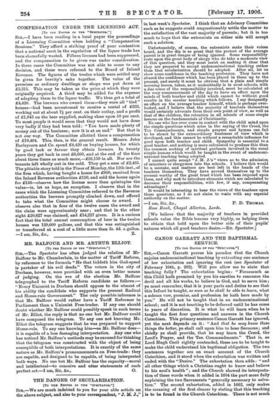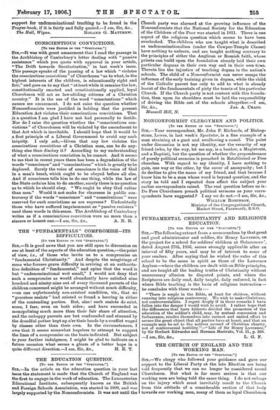CANON GARRATT AND THE BAPTISMAL SERVICE.
[To THE EDITOR OF THE "SPECTATOR."] SIR,—Canon Garrett proves his paradox that the Church enjoins undenominational teaching by extracting one sentence of her exhortation and ignoring the rest (see Spectator of February 10th, p. 202). Will you allow me to state that teaching fully ? The exhortation begins : " Forasmuch as this Child bath promised by you his sureties to renounce the devil and all his works, to believe in God, and to serve him ; ye must remember, that it is your parts and duties to see that this Infant be taught, so soon as he shall be able to learn, what a solemn vow, promise, and profession he hath here made by you." He will not be taught that in an undenominational school; and it is not teaching to be deferred until he has come to years of discretion. It is what he will learn when he is taught the first four questions and answers in the Church Catechism. This primary sentence Canon Garrett has ignored, yet the next depends on it : "And that he may know these things the better, ye shall call upon him to hear Sermons ; and chiefly ye shall provide, that he may learn the Creed, the Lord's Prayer, and the Ten Commandments." That is, as Lord Hugh Cecil rightly contended, these are to be taught to make the child understand his baptismal obligation. The two sentences together are an exact account of the Church Catechism, and it stood when the exhortation was written and ended with the "Desire." The exhortation then adds : "and all other things which a Christian ought to know and believe to his soul's health"; and the Church showed its interpreta- tion of these words when it added in 1604 the part more fully explaining the two Sacraments "generally necessary to salva- tion." The second exhortation, added in 1662, only makes the meaning of the first clearer by stating that this teaching is to be found in the Church Catechism. There is not much support for undenominational teaching to be found in the Prayer-book, if it is fairly and fully qtroted.—I am, Sir, (to., The Hall, Wigan. ROLAND G. MATTHEW.











































 Previous page
Previous page